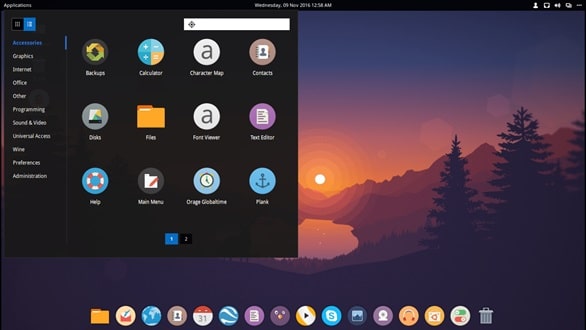Linux has become a household name in the tech industry, synonymous with flexibility, security, and innovation. As an open-source operating system, Linux offers users a unique environment that encourages collaboration and community-driven development. Join Banger Casino Online as we explore the world of Linux, its history, key features, distributions, applications, and its significance in today’s technological landscape.
The Origins of the Linux Operating System

The Birth History of Linux
The story of Linux began in 1991 when a Finnish computer science student named Linus Torvalds decided to create a free operating system kernel. Inspired by the MINIX operating system, Torvalds aimed to develop a kernel that would be more powerful and flexible. He announced his project on the MINIX newsgroup, inviting other programmers to contribute.
The Open Source Movement
The success of Linux can be attributed to the broader open-source movement, which advocates for the free distribution and modification of software. The GNU (GNU’s Not Unix) project, initiated by Richard Stallman in the 1980s, aimed to create a free Unix-like operating system. Torvalds’ Linux kernel became the missing piece needed to complete a fully functional operating system, and as a result, many early Linux distributions were developed using GNU components.
Key Features of Linux OS
Open Source and Free Software
One of the defining characteristics of Linux is its open-source nature. This means that the source code is freely available for anyone to view, modify, and distribute. Users can customize the operating system to meet their specific needs, which is a significant advantage over proprietary operating systems.
Stability and Security
Linux is known for its stability and security. It is built on a robust architecture that minimizes the chances of crashes and system failures. Additionally, Linux has a reputation for being less susceptible to malware and viruses, making it a preferred choice for servers and critical systems.
Flexibility and Customization
Linux offers unparalleled flexibility, allowing users to choose from a wide range of distributions (distros) that cater to different use cases. Users can customize their environment, desktop environments, and software packages to create a tailored experience. This adaptability makes Linux suitable for various applications, from personal computers to servers, embedded systems, and supercomputers.
Community Support
The Linux community is vast and vibrant, comprising developers, users, and enthusiasts who contribute to its development and support. Online forums, mailing lists, and documentation provide users with resources to troubleshoot issues, share knowledge, and collaborate on projects. This community-driven approach fosters innovation and continuous improvement.
Popular Linux Distribution
Ubuntu
Ubuntu is one of the most popular Linux distributions, known for its user-friendly interface and ease of use. It is based on Debian and offers regular updates, a large software repository, and a supportive community. Ubuntu is suitable for both beginners and experienced users, making it an excellent choice for those transitioning from other operating systems.
Fedora
Fedora is a cutting-edge distribution sponsored by Red Hat, known for incorporating the latest technologies and features. It focuses on open-source software and offers a robust development environment. Fedora is ideal for developers and tech enthusiasts who want to experiment with new tools and technologies.
CentOS
CentOS (Community ENTerprise Operating System) is a distribution derived from Red Hat Enterprise Linux (RHEL). It is designed for servers and enterprise environments, providing a stable and secure platform for running applications. CentOS is widely used in data centers and cloud environments due to its reliability.
Debian
Debian is one of the oldest Linux distributions, known for its stability and commitment to free software principles. It serves as the foundation for many other distributions, including Ubuntu. Debian is favored by experienced users who appreciate its flexibility and the ability to customize the system to their liking.
Arch Linux Journey
Arch Linux is a minimalist distribution that emphasizes simplicity and user control. It follows a rolling release model, providing users with the latest software updates. Arch is best suited for experienced users who enjoy configuring their systems from the ground up.
Applications of Linux and Open Source
Servers and Web Hosting
Linux dominates the server market, powering the majority of web servers worldwide. Its stability, security, and ability to handle high traffic make it an ideal choice for web hosting and cloud services. Many popular web applications and content management systems, such as WordPress and Joomla, run on Linux servers.
Development and Programming
Linux is a favored platform for developers due to its powerful command-line interface and support for various programming languages. It offers a wealth of development tools, libraries, and frameworks, making it suitable for software development, web development, and scripting.
Embedded Systems
Linux is widely used in embedded systems, powering devices such as routers, smart TVs, and IoT devices. Its lightweight nature and flexibility allow developers to customize the operating system for specific hardware and use cases.
Scientific Computing
Linux is prevalent in scientific research and high-performance computing environments. It provides the necessary tools and performance capabilities to handle complex calculations, simulations, and data analysis. Many scientific applications and libraries are optimized for Linux.
Desktop Environments
While Linux is commonly associated with servers, it also offers a rich desktop experience. Users can choose from various desktop environments, such as GNOME, KDE, and XFCE, to create a personalized computing experience. Linux desktops are suitable for everyday tasks, multimedia consumption, and productivity.
The Future of Linux
Increasing Popularity
The future of Linux looks bright as more users and organizations recognize its advantages. With the rise of cloud computing, containerization, and DevOps practices, Linux continues to play a pivotal role in shaping the technological landscape. Its open-source nature fosters collaboration and innovation, ensuring that it remains relevant in the ever-evolving tech world.
Cloud and Container Technologies
Linux is the foundation for many cloud services and container technologies like Docker and Kubernetes. These technologies enable developers to deploy and manage applications efficiently, making Linux an essential component of modern software development and deployment.
Community-Driven Development
The strength of the Linux community lies in its commitment to collaboration and open-source principles. As new contributors join the community, the operating system will continue to evolve and adapt to changing technological needs. Community-driven development ensures that Linux remains at the forefront of innovation.
Conclusion
Linux has come a long way since its inception in 1991. Its evolution into a powerful, flexible, and secure operating system has made it a favorite among developers, enterprises, and everyday users. The open-source nature, diverse distributions, and supportive community contribute to its continued growth and relevance in the tech industry. As we move into the future, Linux will undoubtedly play a crucial role in shaping the next generation of technology, fostering collaboration, and empowering users worldwide. Whether for personal use, development, or enterprise applications, Linux is poised to remain a key player in the operating system landscape.

















